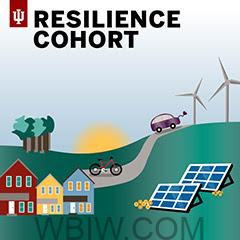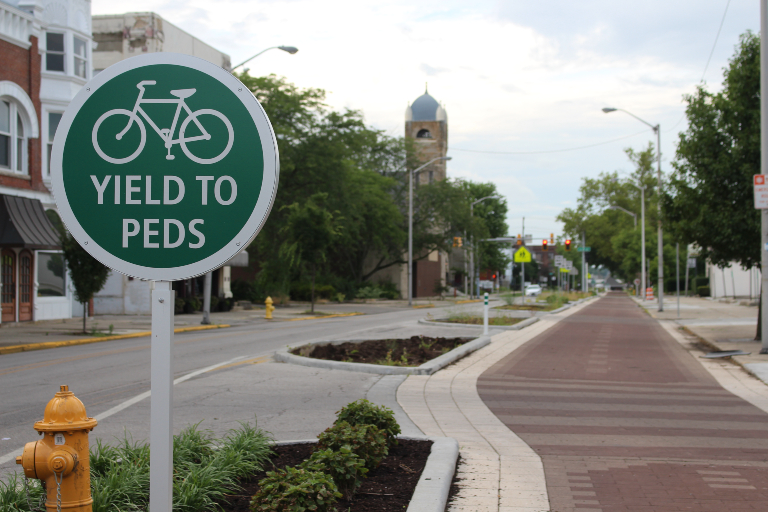
INDIANA – Two Hoosier communities recently published their official road maps to address climate change, the culmination of a years-long process kickstarted by the Environmental Resilience Institute’s (ERI’s) Resilience Cohort program.
This summer, Richmond and Carmel became the latest Indiana municipalities to lay out a coordinated vision for how community leaders plan to reduce local greenhouse gas emissions and protect residents and businesses from climate change impacts, such as extreme heat and precipitation. Since 2019, both communities have been involved with ERI’s Resilience Cohort, which provides guidance and support for Indiana city, town, and county governments to measure and reduce local greenhouse gas emissions and implement climate resilience strategies.
The Carmel City Council unanimously approved its plan in August, and Richmond’s Common Council did the same in September. In Indiana, 17 Hoosier communities, representing about half of the state’s residents, have adopted or are in the process of creating a climate action plan.

“Climate change is a global problem, but more and more communities in Indiana and elsewhere are understanding that local solutions are critical to ensuring that their residents are positioned to thrive,” said ERI Resilience Implementation Manager Matt Flaherty. “The climate action plans recently adopted by Richmond and Carmel will give local leaders a solid foundation to guide decision making and tackle the long-term challenges posed by a warming planet. Congratulations to both communities for adopting these plans.”
Richmond’s plan is the result of months of public outreach and consultation with local government and community stakeholders. The plan outlines the risks and vulnerabilities climate change presents to the city as well as strategies to adapt to climate change impacts and reduce the emissions that worsen the crisis.
The document covers nearly 70 strategies, spanning energy, transportation, and wastewater management. Additionally, the plan includes recommendations to increase the resilience of buildings, adopt sustainable land use policies, and promote economic development.
“I see the climate action plan as a quality of life and livability plan for the city,” said City of Richmond GIS Coordinator Grayson Hart, who helped develop the plan. “Getting people involved is easier if they can see how many of the things that they care about related to living, working, and playing in this city are a key part of this comprehensive effort.”

Similarly, Carmel’s plan incorporates the input of many stakeholders, including city residents, youth, and local government staff. The plan identifies 43 climate action and resilience strategies and sets a goal to reduce community-wide greenhouse gas emissions by 45 percent by 2035 and reach net zero by 2050.
“A key objective of ours was to make the plan strong enough to show residents that we were aiming for meaningful changes for greenhouse gas reductions and climate resilience, while also making sure the plan was workable for our city departments,” said Alexia Lopez, Planning Administrator for the City of Carmel. “Our hope is, now that we’ve adopted the plan, we can use it to begin implementing resilience projects and continually tweak it as we move forward, keeping our partners involved along the way.”
Both communities hosted McKinney Climate Fellows—IU students interested in contributing to the state’s sustainability and resilience—to lead community outreach and help advance their plans. Carmel also worked with a consulting agency, Gnarly Tree Sustainability Institute, to synthesize feedback and draft its plan.
Already, Carmel has begun working on several climate-related initiatives, including increasing the adoption of electric vehicles and encouraging alternative transportation, such as walking and biking.
“Whether it’s composting or energy emissions, the plan will serve as a road map for us to get started on some of these important initiatives throughout the city,” Lopez said.
View Richmond’s Climate Action Plan
View Carmel’s Climate Action Plan
About the Environmental Resilience Institute
Indiana University’s Environmental Resilience Institute brings together a broad coalition of government, business, nonprofit, and community leaders to help Indiana and the Midwest better prepare for the challenges of environmental change. By integrating research, education, and community, ERI is working to create a more sustainable, equitable, and prosperous future. Learn more at eri.iu.edu.
Information: Cody Smith, Environmental Resilience Institute.



